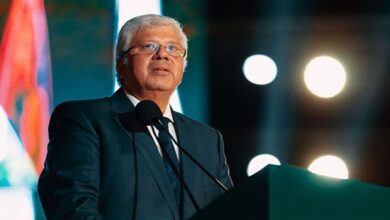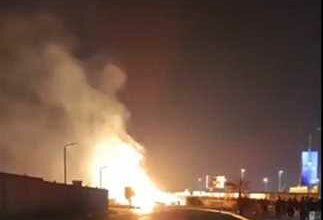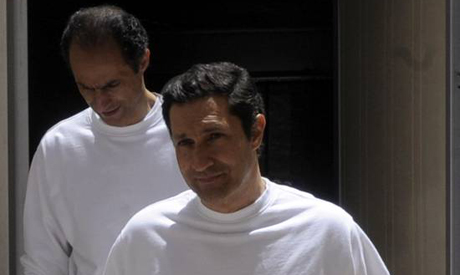The two blocks of residential buildings and humble businesses known as the Swiss District are tucked away in the back streets of Nasr City. While the neighborhood’s name might suggest cozy log cabins and fondue restaurants, in reality, the Swiss District features the same post-apocalyptic aesthetic that is dominant throughout Nasr City. What sets it apart, however, is its population–a unique blend of nationalities and ethnic groups.
“We have representatives from all over the world living here,” says Ahmed Fahim, 22, who works in a telecommunications store in the Swiss District. “The majority of foreigners living here are from Somalia, but we also have people from Nigeria, China, Japan, Indonesia, Malaysia, America, Turkey, Russia, and England,” Fahim says. “It’s like the United Nations up here, except we all get along.”
At work, Fahim interacts with foreigners on a daily basis and claims that the overall effect has been good for business. He points out that in most cases, foreigners are here for work or to study, which means that they contribute to the neighborhood’s economy without competing with locally-owned establishments.
Fahim also says there is another important factor.
“We’re all Muslim here, we’re all brothers,” he says, citing what he believes is the glue holding his community together. “There’s no reason for us to fight.”
This is not to say the area is without problems. “If there’s any trouble, it’s the Somalis," Fahim says. "They can’t get jobs, so they turn to crime. The other day, a group of them broke into a family’s apartment and tried to steal their stuff. Me and my neighbor got involved, though. We beat them up and kept them in their place till the police came.”
Fahim lists a few other examples before making a claim repeated by many Swiss District residents: “The Somalis are getting to be a problem.”
Not everyone, however, agrees. “No, the Somalis are not a problem,” says Mohamed E., who owns one of the neighborhood’s many internet cafés. Mohamed moved to the Swiss District from his native Somalia two years ago, but he does not resent the growing anti-Somali sentiment he says is shared by his neighbors. Instead, shrugs off the accusations.
“Everyone causes trouble, we do not cause more,” Mohamed says, laughing. “The Sudanese people cause trouble. They attack people at night, hit them in the head with machetes, and take their wallets and phones,” he says, swinging an invisible blade. “But that was then. They are all gone now.”
Idris, a 22-year-old Chinese student at Al-Azhar and resident of the Swiss District, admits that crime is a problem. “My friend and I were mugged just the other night by a group of Egyptians. They held us at knifepoint.” While his friend has been desperate to return home following the incident, Idris’s response is more measured. “There are good people and bad people everywhere. Something like this doesn’t just happen in Egypt.”
The Swiss District, which offers cheap housing not far from the city center, has provided a practical solution for low-income immigrant families, Al-Azhar University students, and even refugees. While its streets are not overrun by the lawlessness of ethnic warfare, the Swiss District is certainly not an image of a society living in perfect harmony, regardless of what many of its residents say. The streets are eerily quiet, save for the sounds the Quran emanating from windows and shops and the laughter of a gang of young Egyptian schoolchildren chasing two Asian men. The teenagers who loiter around every curb seem to be grouped according to skin color rather than age.
Newcomers to the Swiss District attract suspicious stares. Al-Masry Al-Youm was disheartened by the number of Asians who ran away when approached, and extremely worried when a serious-looking group of Somali men surrounded the correspondent to ask what he wanted.
Tawfik Abdel Khalik, 52, the head of the Swiss District’s neighborhood council, says that the problem is bigger than that of crime by Somalis. “These foreigners are like an infection attacking this community. They’re like a plague.”
While they may sound like the harsh words of a committed xenophobe, Abdel Khalik insists that he doesn’t have anything against foreigners–just the effects that these particular foreigners have had on his community. According to Abdel Khalik, the Swiss District’s cheap rates and obscure location make it doubly appealing for foreigners who don’t necessarily want to be found, which, in his opinion, is the first sign of trouble.
“You know what happened in America after the Vietnam War? Those soldiers went through a traumatizing, nightmarish experience and at the end of it, returned to a country they could no longer relate to,” Abdel Khalik says pointing through the bars covering the only window in his sparsely furnished office to a group of men sprawled out on the steps of a building at the end of the narrow, filthy street.
“Look at those Somalis. They escaped from the violence and mess of their country, and now all they do is sit there all day long, in a country that isn’t theirs, living off of the US$500 a month that they receive in aid from the United Nations. For some of them, it’s not enough and they resort to crime. The rest of them don’t seem to care. Either way, they can’t get jobs. And why should they when Egyptians can’t even find jobs in this country?”
Abdel Khalik is well aware of the problems brewing within his community, eroding everything, he claims, from the infrastructure to “whatever it is that’s still holding people back from slaughtering each other.” His recent attempt to engage the attention of the appropriate authorities left him even more disheartened. “I went to the Nasr City Town Hall and, after a long time, was finally allowed to see the Major General. I told him about our problems and he just looked at me and asked “What’s a Swiss District?”
“As the head of the neighborhood council, I should know everything about this place,” says Abdel Khalik. “I should know everyone who lives here, where they live, what they do. People should be bringing their problems to me.” He swings his arms around, lamenting the fact that his office is little more than a gutted desk and two wobbly chairs, a forgotten room in an unknown district. “I know nothing,” he sighs.
"The real problem is us, the Egyptians," says Fathi Ibrahim, an electrician in the Swiss District. "It’s corruption. That’s what the problem always is. Look at that!” he fumes, pointing outside his store. A small mountain of trash lies across the street and dogs mate in a paw-deep puddle of sewage. “You call that a view? This is supposed to be a nice, classy neighborhood. There’s a neighborhood council that we pay money to, that I personally pay money to, for things like this. And they constantly lie to us and steal our money. The streetlights don’t work at night, and people keep getting mugged and raped. The sewage system continuously explodes and floods the entire neighborhood.”
“The sewage system is a problem,” agrees M.S., who spends her nights behind the counter of a stationary shop and her days as department head at the Nasr City Water Company. “Because the Swiss District is built on a slope, it turns into a waterfall of sewage that collects at the bottom and hardens to sludge. It attracts bugs, mosquitoes, and insects you’ve never even seen before.” A resident of the Swiss District for the past eight years, M.S. is worried her neighborhood may soon become uninhabitable–at least as far as she’s concerned. “It’s dangerous. Between the darkness and the crime and the sewers and the mounting trash…what kind of life is this?”
Fathi Ibrahim is equally despondent. “There’s no respect for the rules or for sanitation and general cleanliness,” he says, shaking his head. “Just down the street there’s an unregistered nursery that’s basically a roomful of kids coughing swine flu germs all over each other. Where’s the sense of responsibility?”
Moments later, Ibrahim points out what is by far the most obvious feature of his modest establishment–a screaming monkey, furiously spinning a circle inside a lopsided birdcage. “I’ll give you that monkey for LE1500,” says Ibrahim, suddenly cheerful. “He’s clean and friendly.” Ibrahim lowers his hand into the cage and the monkey attacks it. After a string of expletives, Ibrahim rubs his hand, grimaces and says, “He’s from Saudi Arabia. See? Even the monkeys here are foreign.”




